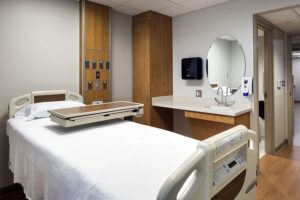Now with confirmed cases, Metro East hospitals brace for COVID-19 surge
By Bob Pieper for Chronicle Media — March 16, 2020

Memorial Hospital Belleville and other local medical centers are bracing for the treatment and testing of coronavirus patients. (Photo courtesy of McGrath Construction)
Across the country, healthcare organizations are bracing for epidemic levels of COVID-19 patients.
And Greater St. Louis, where healthcare is now among the region’s largest industries, is no exception.
St. Clair County Health Department reported two confirmed cases as of Saturday, March 14. One is a woman in her 60s and the other is a woman in her 70s. Both individuals were quarantined after being tested and both had a history of international travel, according to the health department.
All contacts to these two cases are being interviewed and quarantined as indicated, according to the statement released by the St. Clair County Health Department.
In addition to an overflow of cases, hospitals are preparing for potential understaffing, supply shortages, rapid increases in remote working arrangements by employees to help prevent the spread of the disease, and increased costs, according to the trade publication Becker’s Hospital Review.
Some 70 million to 150 million Americans are now expected to contract COVID-19, according to a closed-door, Washington D.C. presentation, March 11, by Brian Monahan, M,D., the attending physician of Congress and the U.S. Supreme Court.
The spread of C0VID-19 could extend into 2021, according to a presentation last week by Nancy Messonnier, M.D., director of the National Center for Immunization and Respiratory Diseases at the U.S. Centers for Disease Control and Prevention (CDC).
However, most cases are expected to be mild, Messonnier emphasized.
Hospital treatment of COVID-19 could be complicated by the ongoing implementation, in many institutions, of new information technology systems, which may or may not facilitate remote diagnosis or work at home arrangements and which may be difficult for new or temporary staff to use, Becker’s notes.
Many general hospitals do not have Infectious-disease departments, which are found mostly in academic medical centers.
A widespread COVID-19 outbreak in U.S. would threaten many hospitals’ finances, according to the trade publication Modern Healthcare.
“Hospitals that are already financially strapped are bracing for even more strain if the coronavirus outbreak gains further momentum in the U.S.,” the magazine reported last week.
COVID-19 patients typically will require treatment in intensive care units, which are expensive to operate, Modern Healthcare notes.
The Trump administration last week, following a meeting with insurance executive, announced plans to increase coverage for COVID-19 patients; however, details of the plan have yet to be released.
Fortunately, at least from a hospital management point of view, St. Louis area hospitals on average have about an 11 percent operating margin —higher than the national average, according to the 2018 St. Louis Health Care Industry Overview, compiled by the St. Louis Area Business Health Coalition.
That could better position hospitals here to withstand any financial challenges associated with COVID-19.
BJC HealthCare, the area’s largest healthcare provider and largest employer, last month reported increasing profits, following losses in a couple of recent years.
BJC’s appear to be the first publicly available annual financial statements for 2019. Several major hospital chains release financial statements in February or March each year.
The CDC on Feb. 28 released its Coronavirus Disease 2019 (COVID-19) Hospital Preparedness Assessment Tool and Coronavirus Disease 2019 (COVID-19) Hospital Preparedness Tool.
However, the Chronicle could not, at deadline, identify any area hospitals that had completed such formal COViD-19 readiness assessments.
At BJC HealthCare, a team has been established to monitor the COVID-19 pandemic and ensure the 15-hosptial network has appropriate training, resources and expertise to manage suspected or confirmed cases, according to BJC senior vice president and chief clinical officer Clay Dunagan, M.D.
“The team is also working to ensure we have plans in place in the event we see a surge of patients in our emergency departments,” Dunagan said in a statement on the BJC website.
The team is working with the CDC on the most up-to-date screening, testing and treatment recommendations, he continued.
Active phone screening and posted signs at hospital entrances are being used to identify potential COVID-19 at-risk patients and direct them to designated areas; where further screening, infection prevention protocols, and if necessary, coordination with the CDC can be initiated.
In addition to its flagship, Barnes-Jewish Hospital in St. Louis, BJC operates Alton Memorial Hospital, Memorial Hospital in Belleville and Memorial Hospital East in Shiloh.
The first St. Louis area individual to be considered a suspected COVID-19 case, under CDC guidelines, was tested at Memorial Hospital Belleville on Feb. 28. However, test results were negative for the virus, according to a hospital statement.

Local health officials and county health departments, like Madison County, will be relied to help with public information and getting patients access to testing. (Photo courtesy of Madison County)
OSF HealthCare, which operates OSF St. Joseph’s Hospital in Alton, has long taken “a proactively cautious approach” to the spread of infectious conditions, according to a company alert issued March 5 to the Alton area.
Infection prevention specialists are on-staff at all OSF hospitals. Designated rooms with special ventilation are available for examination of potentially infectious patients.
Executive teams monitor advisories from CDC and the Illinois Department of Public Health (IDPH) on the COVID-19 outbreak.
OSF began curtailing visiting to patients, as infection control measure, back with the start of the annual influenza season in December, well prior to the emergence of COVID-19.
Anderson Hospital in Maryville has also established a COVID19 Planning Team to ensure appropriate care, prepare for a potential surge in patients, and monitor guidance from state and federal authorities.
Like other hospitals in the area, Anderson has implemented protocols to isolate potential COVID-19 patients from other patients in the hospital and is working to prepare for possible supply and staff shortages.
“Emergency preparedness training is a year-round activity that is done at Anderson Hospital in conjunction with other facilities, the region and across the state,” the hospital notes in a prepared statement. “Anderson Hospital treats patients with a variety of infectious diseases on a daily basis. These patients are isolated and treated in appropriate spaces by trained staff using specialized equipment.”
The Anderson Hospital statement emphasizes that testing for the COVID-19 in their service area must be arranged through local public health officials, such as the Madison County Health Department, and cannot be provided to individuals by request at this time.








